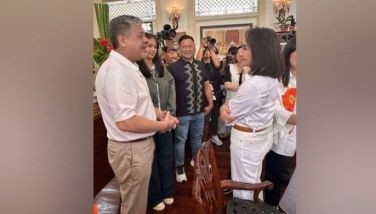Breaking racial barriers when a nightmare for some becomes an opportunity for others
CEBU, Philippines - For the victims, Yolanda was a nightmare. But the super typhoon that shattered the Visayas last year actually became an opportunity for a group of like-minded individuals to help those in dire need.
The Filipino and Bendigo communities in Victoria, Australia were taken aback by the degree of devastation brought about by the strongest typhoon to hit earth in recorded history. They shared the same concern and eagerness to lend a hand to the typhoon victims.
Hence, the Bendigo-Filipino Foundation Inc. (BFFI) was founded two days after the storm battered the country. It is a registered non-profit organization predominantly composed of Filipinos and primarily aims to provide assistance in calamity-stricken areas in the Philippines.
Dr. Voltaire Nadurata currently heads the foundation that has 19 committee members.
Bendigo is a regional city at the heart of Victoria, considered to be the second most populous state in Australia. It is situated 150 kilometers north of Melbourne.
The old gold mining town back in the 1850s now has a population of approximately 100,000 people. At present, Bendigo has an increasing Filipino migrant community, a sizable chunk of which come from Visayas.
Moreover, the Catholic Diocese of Sandhurst in which Bendigo belongs has established a strong partnership with the Archdiocese of Cebu. There were priests who moved from Cebu to Bendigo to study in Australia and eventually served as parish priests in the diocese. There are also Filipino seminarians who study in Australia under the auspices of the Catholic Diocese of Sandhurst.
Geoff Stephens, a BFFI committee member, shared that Fr. Pantaleon Amaya Jr., who is the parish priest in St. Liborius in Eaglehawk, Bendigo, recommended to the foundation to help the affected families in Doong Island in the northern town of Bantayan, Cebu.
This was after the former parish priest of Doong, Fr. Isaias Gerali, cited the lack of assistance in that remote islet.
Through the strong connection between the two parish priests, the immediate relief efforts of the foundation first mobilized in December of last year. Donations of food and clothing were directly sent to identified recipients in Doong via balikbayan boxes.
“No one in Doong Island was a relative from Bendigo but because of that connection, it was decided as the area to concentrate on. There were a lot of help everywhere but this island did not receive any,” Stephens said.
Then on, BFFI conducted fund-raising activities, such as concert-for-a-cause, and have become recipients of other local non-government organizations.
Through the unified efforts and generosity of the people in Bendigo, the foundation was able to raise 60,000 Australian dollars or equivalent to P2.4 million since they began the initiative.
The initial relief program that amounted to P80,000 was able to help affected families in four barangays in Doong Island, namely Botigues, Doong, Lipayran and Luyongbaybay. They also helped the locals to build back 40 partially-damaged houses.
Last May, BFFI came to Cebu for their first visit in Doong to distribute 200 donation boxes to 2,000 families in the islet.
Ten months have already passed after Yolanda but Stephens said some of the typhoon victims’ needs remain unmet.
Francis Maranga, who serves as the local contact of BFFI in Doong, said the lengthy travel to the island makes the volunteers and donors give up in reaching out to the area.
“It could take a day to go there from Cebu City. Daghan man unta gustong motabang pero grabe siya kalayo,” he said.
Stephens said BFFI is primarily geared towards a long-term commitment to help affected families in Doong. In fact, at least 40,000 Australian dollars or P1.6 million of the total donations will be intended for the reconstruction of the houses in the island.
Stephens came back to Cebu last Wednesday with Arnel Aquino, a Filipino and the vice president of the foundation, for a ten-day visit in Doong.
Stephens and Aquino are both builders from Bendigo. They will help organize the construction of houses for the typhoon victims and are currently planning to build 53 totally-destroyed houses in Liparan, a neighboring barangay of Doong.
They intend to allot more than P20,000 for each housing unit. They also plan to introduce recycling of housing materials left by the typhoon.
Aquino then revealed that they are planning to provide livelihood assistance to the typhoon victims after it crippled the people’s livelihood.
He said the Doong islet is a fishing village with kelp and seaweed farming as the main source of income among locals.
Moreover, on Sunday, the team will conduct an island forum in Barangay Lipayran wherein they will meet the locals and discuss about livelihood opportunities the foundation can assist with.
“We believe that through discussion and meaningful cooperation with the local authorities, we can also find other means of assisting them with their needs. This may extend to different concerns, including health and education,” he said.
Stephens said the willingness and enthusiasm of BFFI to help Doong Island is inspired by the generosity of the people in Bendigo.
“The people in Bendigo are driven by God to help wherever we can and whatever we can. We are not restricted by religion or race,” he said.
He further said the Yolanda victims in the Philippines served as the catalyst for the foundation and drew the humanity together.
“God has given us good hearts. We didn’t ask for it. People just give,” he concluded. /JMD (FREEMAN)
- Latest



















